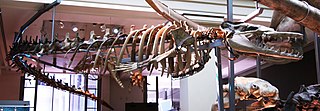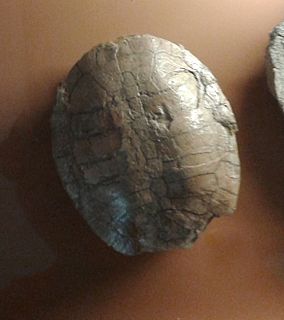
Basilosaurus is a genus of large, predatory, prehistoric archaeocete whale from the late Eocene, approximately 41.3 to 33.9 million years ago (mya). First described in 1834, it was the first archaeocete and prehistoric whale known to science. Fossils attributed to the type species B. cetoides were discovered in the United States. They were originally thought to be of a giant reptile, hence the suffix "-saurus", Ancient Greek for "lizard". The animal was later found to be an early marine mammal, which prompted attempts at renaming the creature, which failed as the rules of zoological nomenclature dictate using the original name given. Fossils were later found of the second species, B. isis, in 1904 in Egypt, Western Sahara, Morocco, Jordan, Tunisia, and Pakistan. Basilosaurus has a possible record in Seymour Island in Antarctica as well. Fossils have also been unearthed in the southeastern United States. In 2022, fossils of Basilosaurus were unearthed in Peru.

Dermochelyidae is a family of turtles which has seven extinct genera and one extant genus, including the largest living sea turtles.

Basilosauridae is a family of extinct cetaceans. They lived during the middle to the early late Eocene and are known from all continents, including Antarctica. They were probably the first fully aquatic cetaceans. The group is noted to be a paraphyletic assemblage of stem group whales from which the monophyletic Neoceti are derived.

Dorudon ("spear-tooth") is a genus of extinct basilosaurid ancient whales that lived alongside Basilosaurus 40.4 to 33.9 million years ago in the Eocene. They were about 5 m (16 ft) long and fed on small fish and mollusks. Dorudon lived in warm seas around the world. Fossils have been found along the former shorelines of the Tethys Sea in present-day Egypt and Pakistan, as well as in the United States, New Zealand, and Western Sahara.
Bouliachelys is an extinct genus of sea turtle from Cretaceous Australia. Its parent taxon is the clade Dermochelyoidae.

Georgiacetus is an extinct genus of ancient whale known from the Eocene period of the United States. Fossils are known from Georgia, Alabama, and Mississippi and protocetid fossils from the right time frame, but not yet confirmed as Georgiacetus, have been found in Texas and South Carolina.

Cearachelys is an extinct genus of pleurodiran turtle which existed some 110 million years ago. The genus is monotypic, with only type species Cearachelys placidoi known.

Cynthiacetus is an extinct genus of basilosaurid early whale that lived during the Late Eocene Specimens have been found in the southeastern United States and Peru.
Gaviacetus is an extinct archaeocete whale that lived approximately 45 million years ago. Gaviacetus was named for its characteristic narrow rostrum and the fast pursuit predation suggested by its unfused sacral vertebrae.

Chrysocetus is a genus of extinct early whale known from Late Eocene-aged fossils of the eastern United States and western Africa.

Basilosaurinae is a subfamily of cetaceans archaeocetes containing two genera: Basilosaurus and Basiloterus. They were characterized by elongated distal thoracic vertebrae, lumbar, and proximal sacrococcygeal. All known members of the subfamily are larger than their relatives of the Dorudontinae subfamily except Cynthiacetus.
Natchitochia is an extinct protocetid early whale known from the Middle Eocene Cook Mountain Formation in Natchitoches Parish, Louisiana.
Eocetus is an extinct protocetid early whale known from the early late Eocene Giushi Formation in Gebel Mokattam, outside Cairo, Egypt. The specimen was first named by Fraas as Mesocetus schweinfurthi. However, the name Mesocetus was previously used causing a change to the species name to Eocetus schweinfurthi. Since the genus was first described in the early 20th century, several other specimens, mostly isolated vertebrae, have been attributed to Eocetus, but the taxonomic status of these widely distributed specimens remain disputed.

Galianemys is an extinct genus of turtle in the family Bothremydidae, discovered in the Kem Kem Beds.
Araiochelys is an extinct genus of bothremydid pleurodiran turtle that was discovered in the Ouled Abdoun Basin, Morocco. The genus consists solely of type species A. hirayamai.
Eotaphrosphys is an extinct genus of bothremydid pleurodiran turtle that was discovered in the Mont Aime Formation, France. Originally assigned to the genus "Tretosternum", it consists exclusively of type species E. ambiguum.
Taphrosphys is an extinct genus of bothremydid pleurodiran turtle that was discovered Angola, Morocco and the United States. The genus consists of type species T. sulcatus, T. ppolitoi, T. congolensis, and the dubious T. dares.
Phosphatochelys is an extinct genus of bothremydid pleurodiran turtle that was discovered near Oued Zem, Morocco. The genus consists solely of type species P. tedfordi.
Ummulisani is an extinct genus of bothremydid pleurodiran turtle that was discovered in the Mrah Iaresh locality of Morocco. The genus consists solely of type species U. rutgerensis.
Labrostochelys is an extinct genus of bothremydid pleurodiran turtle that was discovered in the Ouled Abdoun Basin, Morocco. The genus consists solely of type species L. galkini.









